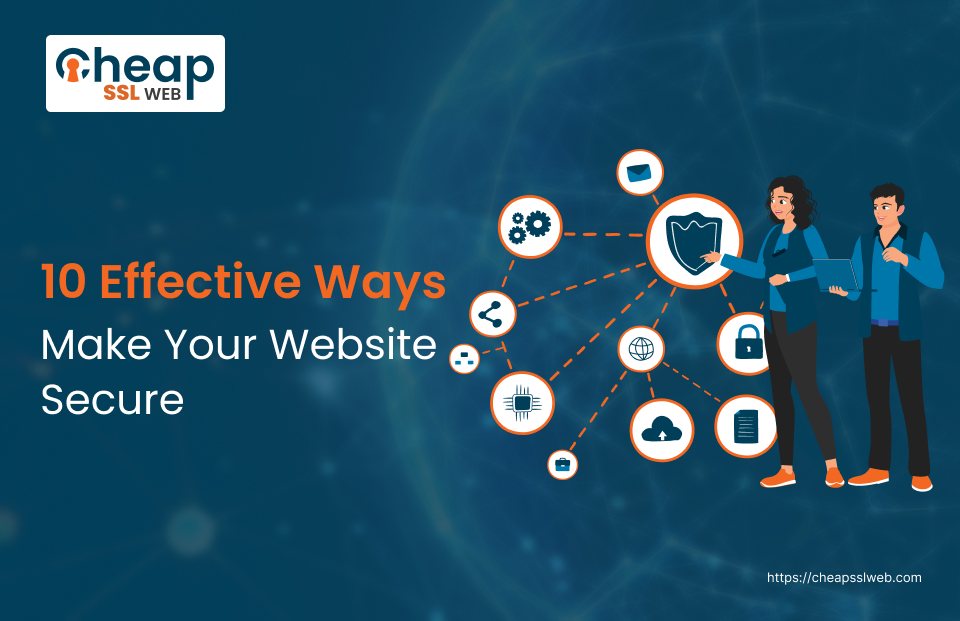What is Website Security? 10 Ways to Make Your Website Secure

Cybercrime is a very common word nowadays for every website owner.
According to reports, the average value of a data breach in 2023 was $4.45 million.
These security breaches require powerful avant-garde protection. That’s why implementing frequent routine checks and taking preventive measures can save you time and money and build trust with customers.
What is Website Security?
A strong and secure online presence enhances visibility and builds reliability. With the increase in website building, cyber-attacks are also growing rapidly. Data breaches release sensitive information, ruining the company’s reputation and leaving users’ identities at risk. Human error is also one of the major reasons for cyber security breaches.
However, with the right safeguard, one can save time, money, and user’s sensitive data. In this blog, we are going to discuss some methods that will help to secure your website.
Let’s begin!
How to Make your Website Secure using Simple Methods?
According to reports, companies with high-tech teams of website security also face frequent website attacks. The most crucial step of website security involves keeping your customers’ information safe from hackers.
Below are 10 important ways to safeguard your website from cybercrimes and hackers.
Install an SSL Certificate
The secure sockets layer develops an encrypted link between a web browser, and a server, which means the data exchanged between the website and the visitor is safe, making it hard for hackers to decipher.
SSL certificates are compulsory for owners of websites specially e-commerce stores. You pay a yearly fee for one. It plays a crucial role for websites that accept payments, transfer files, or ask for login details. Without it, your website is vulnerable to hackers.
Timely renewal of SSL certificates is crucial to keeping your website secure consistently.
Benefits of SSL Certificate:
- Increased customer trust
- Increased data security
- Installing SSL boosts your search engine ranking
- Build a brand reputation by developing trust amongst customers.
Also Read: Free SSL vs. Paid SSL. What Is the Difference?
Use Strong Passwords
Guessable passwords are the biggest mistakes when creating a website. Using birth dates, number sequences, and mobile numbers provides hackers with easy access to customers’ information.
A secure password is hard to guess, and updating it regularly makes it more secure. You can make your website secure by using a combination of numbers, alphabets, or special characters.
Also, two-factor authentication adds an extra step by binding the password to another security layer like facial recognition, text code, fingerprint scan, puzzle, etc.
Below are some of the pointers to consider while setting a password:
- Change your password from time to time
- Use a mix of numbers and symbols
- Do not reuse your passwords
- It should be at least 14 characters
Work With Secure Hosting Service
A secure hosting service provider not only keeps the website safe from hackers and malware attacks but also provides fast load times, good uptime, and an easy setup. They ensure that your site is being monitored and downtime is reduced.
A reliable hosting service ensures that your servers are regularly maintained, secure, and backed up, which in turn reduces security breaches. Using a cheap hosting service compromises website security, data sensitivity, and company reputation.
Points to consider before Selecting a Hosting Service:
- They should provide an SSL certificate
- Domain Privacy
- Automated backups
- Keep up with timely security upgrades
Backup your Site Regularly
Data inaccessibility occurs often when website owners do not consider backup as an important part. A good backup solution keeps your website safe and secure and minimizes downtime. You can choose hosting providers to schedule regular backups.
Routine backups are essential if your website is prone to hardware failure, malicious attacks, etc. You can also use various tools that automate backups.
Points to Consider:
- Your website information should be off-site
- Keep your website backup on a hard drive or home computer
- Backup and website should not be on the same server.
Use Web Application Firewall
To avoid malicious traffic on your website web application firewall plays a crucial role. For new vulnerabilities, modern WAFs deploy and modify rules rapidly. Today, WAFs are cloud-based based that attack all hacking attempts.
It identifies if the traffic is safe and removes unauthorized data. A WAF can be network-based, cloud-based, or host-based. It detects malicious attacks and prevents your website from accessing it.
Benefits of WAF:
- Safeguards the website from malware, spam, and automated bots
- Identify and drop traffic surges
- Filters out unwanted traffic
Update Your Site Regularly
Updating your website regularly comprises adding new features and functionalities. Maintaining website compatibility with advanced tools and technologies improves user experience.
These updates identify security flaws that make your website less vulnerable to cyberattacks. An outdated plugin and software puts your website at high risk. Ensure to update your system just after release to safeguard it from possible threats.
Benefits of Site Update:
- Provides a great user experience
- New tools and functionalities
- No bugs and glitches
Scan Your Website
A regular and quick scan of your website helps detect issues and virus attacks and identifies a problem at the initial stage. Various malware scanning services also help minimize threats to your website.
Also, you can invest in a professional website scanner that can help identify in-depth threats that the scanner cannot detect. A professional identifies threats like spam, malware, server, and network vulnerabilities.
Points to consider:
- Employ a highly skilled professional for website scanning
- Provide a better user experience
- Builds brand reputation
- Regular scan saves the website from heavy damages
Install Security Plugin
Choosing and installing a security plugin is required to save your website from cyber threats. There are various free and paid plugins available on the internet that can prevent your website from attacks. It completely depends on one’s need for which security plugin to choose.
Various CMS provide plugins, and some of them are free for users to use. A security plugin can upgrade your website’s security and build reliability, which will encourage users to choose your platform.
Benefits of Installing Security Plugin:
- High security than other websites
- Easy to use
- Builds trust amongst users
- Zero cyber attacks and malware
Update The Security Plugins
To prevent the injecting of malicious attacks into your system, updating your security plugins is an important step. Hackers look for websites that are not updated regularly as they are easy to inject malware.
Updating manually or with an auto-update feature, security plugging update is a crucial part. Regular updates should comprise themes, WP, and plugins. If you are using web-downloaded plugins or any third-party software, make sure to regularly check for updates on the dashboard.
Tighten Network Security
Examine your network security before thinking your website is secure. Hackers can easily access websites with loose networks, so network security should be considered while developing a website.
A firewall plays a vital role in protecting your network. Hackers look for open ports to attack your website, so protect your network with a configured firewall.
Points to consider
- Make sure the system notifies the user of regular password changes.
- Ensure all devices running on the same network go through a quick scan for malware.
Conclusion
Keeping your website secure is similar to keeping your money secure. It is one of the major concerns which should not be ignored. So, use the above methods to maintain website security.
Various hosting services make the security issue easy for companies. But completely relying on them is not advisable. A safe website is always a user’s topmost priority.
Always ask for a quick check and identify the issues that are hindering your ability to provide a great user experience.
Consumers always look for reliability, a great user experience, and a website that keeps their information and transactions safe from hackers. So, make sure yours is the one by safeguarding it with CheapSSLWeb’s SSL Certificates, which cost starts at just $2.99/Year.
